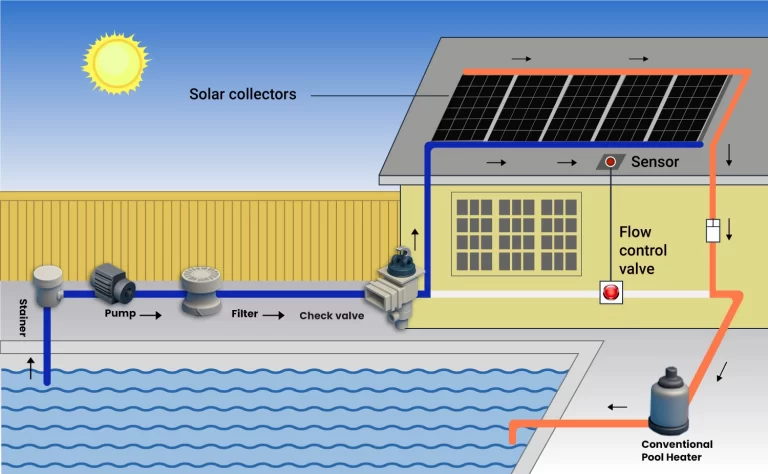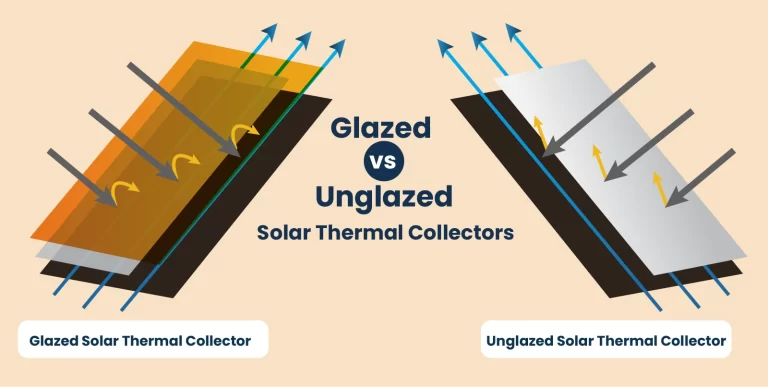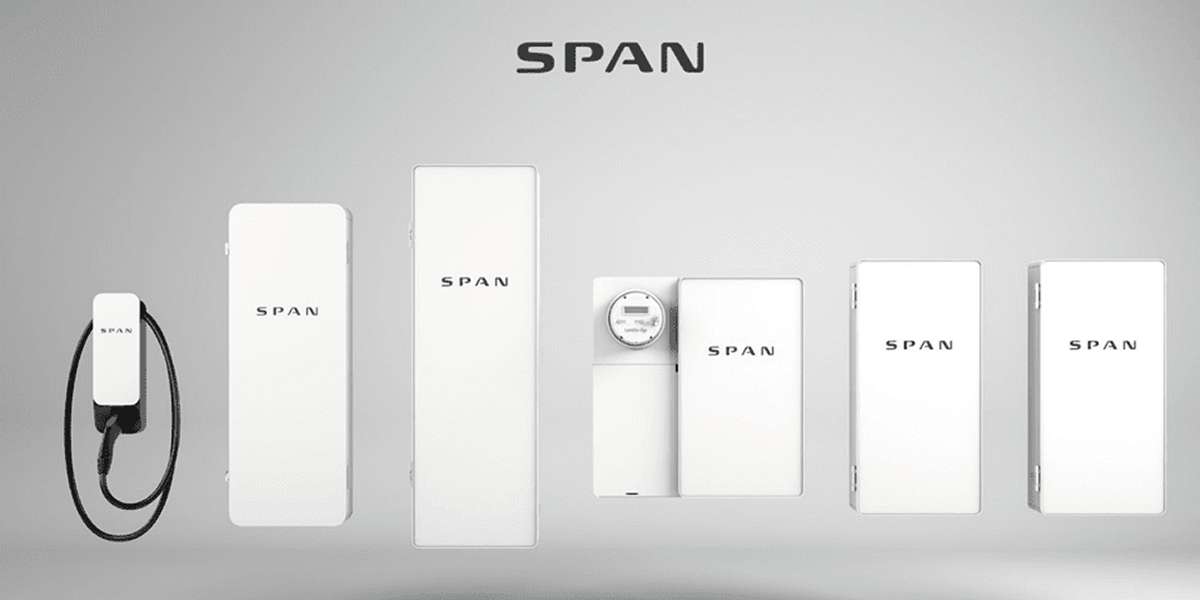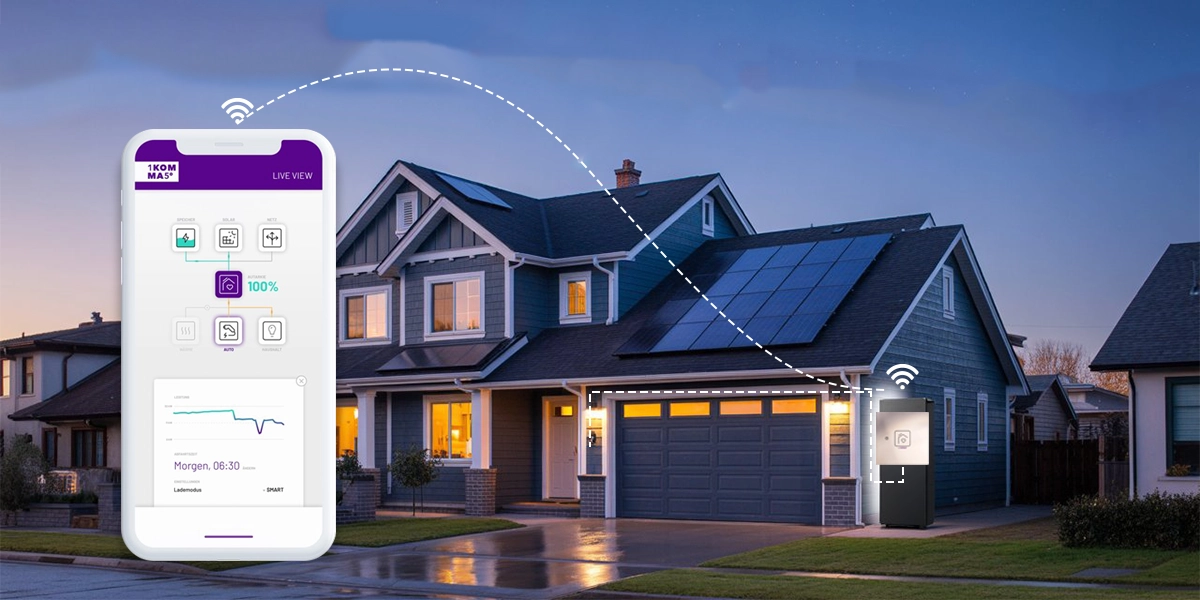- Updated On: August 12, 2025
Solar Pool Heater: The Smart Way to Heat Your Pool Without High Energy Bills
Water heating is among the major reasons for rising electric bills, especially during winter weather, when maintaining a warm pool is challenging. Traditional methods of water heating utilize electricity or gas, which quickly adds up to your bills and is subsequently an expensive option. Solar pool heaters, on the other hand, are a smart and cost-effective solution for heating your pool without high energy bills. By using unlimited sunlight, solar pool heaters heat your pool with solar energy. Depending on your pool and location, solar heaters can be a cleaner and cheaper way to keep your pool heated and ready for use. In fact, in most climates, solar pool heaters have lower annual operating costs and are more efficient than traditional heaters.

If you are curious about how a solar pool heater works, this article is for you. We will highlight the working, benefits, and costs of solar heating systems for a pool.
What is a solar pool heater?
Solar hot water systems heat your pool’s water by using the thermal energy of the sun. A backup heater, a controller system, a heat exchanger, a storage tank, and solar collectors are the main parts of these systems. In addition to lowering greenhouse gas emissions in the atmosphere, solar hot water systems lower your long-term gas and electricity costs.
How does a solar pool heating system work?
Firstly, pool water is pumped out of the pool through a filter. And then, it goes to a solar thermal collector, where it is heated by the sun’s radiation before being put back into the pool. A sensor, flow control valve, and check valve are also necessary for the system to regulate the pool temperature. The system also requires a check valve, a flow control valve, and a sensor to keep the pool temperature in check. Most systems can automatically detect the temperature of the water and transfer it to the solar collector, which will heat the water before returning it to the pool. After the water reaches the appropriate temperature, the flow control valve returns the flow straight to the pool from the solar collector.

Especially in the colder portions of the United States, the solar collector is typically large enough to continue heating the pool even during periods of severe temperatures. Also, it is possible to utilize a solar water heater in conjunction with electric or gas heaters if necessary.
What are solar thermal collectors in a water heating system?
In contrast to the photovoltaic solar panels, you are likely familiar with, these collectors produce heat rather than electricity. Through the glass covering of a collector, sunlight reaches an absorber plate, a component coated to absorb solar energy and transform it into heat. Through tiny pipes in the plate, the produced heat is transmitted to a “transfer fluid” like water. The size of collectors varies. The amount of sunlight your roof receives and the amount of hot water your home uses will determine the size and quantity of solar collectors you require.
What are the major types of solar collectors in a pool heater?
There are two primary types of solar thermal collectors, glazed and unglazed. Let’s have a look at both of them:

Glazed Solar Collectors:
Glazed solar collectors, often referred to as flat-plate solar collectors, are made of metals such as copper tubing and aluminum plate and covered in iron-tempered glass. Their designs are often more complex. These systems can deliver higher levels of heat because they are more space-efficient and can heat water more effectively. Although they can be used all year round, glazed solar collectors are more expensive than unglazed ones.
Unglazed Solar Collectors:
These collectors are often made from heavy-duty rubber or black plastic, and they are ultraviolet (UV) coated to help prolong their useful life. Although unglazed solar collectors are usually less expensive, they are less efficient and only work in warmer climates, such as pools with temperatures above freezing.
Which size collector is right for your solar pool heater?
The Department of Energy (DOE) advises that the solar collector should be between 50% and 100% of the pool’s surface square footage, depending on how many months of the year you intend to use your pool and how warm you like your water. Thus, the ideal size for the solar collector is 150–300 square feet. For homeowners who want to keep their pool open all year round, a bigger or equal-sized solar collector is a good option.
How much does it cost to install and operate a solar pool heater?
A solar heater may cost a little more up front than other options, but it requires very little maintenance and doesn’t require fuel. Although most solar heaters have a payback period of 1.5 to 7 years, the precise duration will vary depending on several factors, such as:

Why should you consider switching to a solar pool heater?
Compared to conventional gas or electric-powered heating systems, solar pool heaters provide many benefits. Solar pool heaters don’t need much upkeep. The only maintenance required is to keep the solar collectors clean to maximize their ability to absorb sunlight. The major advantage, though, is that solar pool warmers don’t require any extra power to operate. Heating your pool doesn’t require you to pay for energy or gas. Instead, you can use unlimited solar power to keep your pool water hot.
Solar pool heater vs solar PV panels: Which option is best?
You might not have enough space for a solar pool heater and solar panels to power your house, depending on the size of your roof. If this happens, you will need to determine which system would save you more money over time by conducting a cost-benefit analysis. However, we advise combining your solar PV system with an effective electric pool heater and pump. In this way, you may use solar energy to power your home and probably save the most. Only 3 to 5 solar panels, depending on panel wattage, will be added to the system to meet the additional electrical requirements of the electric pool heater and pump.
It is advised that you hire a qualified contractor to install the heating systems because solar pool heaters need both plumbing and electrical work, particularly if you want to mount the system on your roof.
Related Articles:
Smart home technology is revolutionizing the way of living by allowing homeowners to manage their power usage and making their home efficient. Ever imagine you can control all your home’s appliances by using your smartphone. Learn More!
With the growing trend of solar energy, people are now looking for more efficient ways of utilizing energy.
Heartbeat technology is a game-changing solar energy management innovation that gets your solar system to "think" and "act" in real-time, like the beat of a heart, and adjust your home's energy needs every second. Learn more about this advancement!



